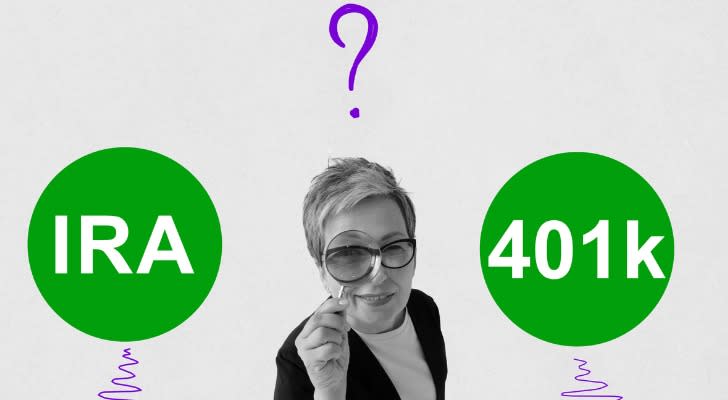Matt Becker, CFP
·5 min read
Is it wise to start converting my 401(k) into an IRA (and then Roth) by 10% per year in order to avoid having to claim too much income each year when converting and also avoid RMDs as much as I can?
-Cathy
It's definitely smart to be thinking about this, Cathy. Systematic Roth conversions like the ones you're describing have the potential to reduce your lifetime tax liability, increase your odds of a successful retirement, boost your flexibility by reducing future RMDs and even leave more money for your heirs.
There's a lot to like, but there are some potential pitfalls as well. It's not always easy to figure out when Roth conversions make sense or how much to convert. Converting 10% of your 401(k) per year may not be the best strategy but here’s what you should be thinking about. (And if you need more help with important financial decisions in retirement,consider working with a financial advisor.)
What's the True Tax Cost?
When considering whether to convert pre-tax money to a Roth account, you need to compare tax rates. If your tax rates are lower now than you expect them to be in the future, then a Roth conversion makes sense. If your tax rates are higher than you expect them to be in the future, you shouldn't convert.
The conventional wisdom then is to look at your federal and state income tax rates now and compare them to what you think they'll be in the future. And while that's a good start, it doesn't always tell the whole story.
As Ben Henry-Moreland explains well here, your marginal income tax rate is only part of the story. Because our tax code includes a multitude of credits, deductions, phase-outs and other variables that are dependent upon taxable income, adding or subtracting income can have a bigger impact than what you'd calculate if you were only comparing income tax brackets.
For example, a Roth conversion could:
Increase the amount of Social Security income that's taxed
Push your capital gains into a higher tax bracket
Decrease the amount of medical expenses you can deduct
Increase Medicare premiums
Of course, the reverse of all of those things could also be true. By converting some of your money to a Roth IRA now, you could lower your taxable income in future years and therefore reduce the amount of Social Security income that's taxed in the future or increase the amount of medical expenses you're eligible to deduct.
In other words, the impact of a Roth conversion could be bigger than expected in either direction.(Afinancial advisorcan help you determine the relevant tax rates so you can make a wise decision on whether or not to convert a 401(k) into an IRA or Roth IRA.)
How to Approach Roth Conversions
While all of that creates opportunities to do some good planning, it does make things a little more complicated. To start, I wouldn't assume that converting 10% per year is the right move. The dollar amount matters a lot more than the percentage since it's the dollar amount that will impact your taxable income and therefore the overall tax cost.
I also wouldn't assume that you should convert the same amount every year. Depending on the rest of your situation, it may be that in some years it makes sense to convert more and in other years it makes sense to convert less.
The best way to make this decision is to run your situation through tax software that can model different scenarios and estimate the lifetime tax cost of each. Projections are never perfect, but this would give you a better idea of the actual impact of converting different amounts from year to year.
That's tough to do yourself, though. If you'd like to get it right, it may be worth working with a good fee-only financial planner. That could be someone you work with on an ongoing basis, or it could be someone you hire on an hourly or project basis just to help you decide how much to convert this year and in the future. (And if you need help finding a financial advisor, try this matching tool.)
Next Steps
If that's too much or just not feasible right now, then using your income tax brackets as a guide would be a reasonable next-best option. Try to calculate your taxable income without any conversions, decide which tax bracket you'd like to fill with your conversions (before going into the next, higher tax bracket) and convert enough to get your taxable income right near the top of that bracket.
Just know that there may be some unintended consequences and that the cost could be higher or lower than expected. (And if you need more help with important financial decisions in retirement,consider working with a financial advisor.)
Tips for Finding a Financial Advisor
Finding a financial advisor doesn't have to be hard.SmartAsset's free toolmatches you with up to three vetted financial advisors who serve your area, and you can have a free introductory call with your advisor matches to decide which one you feel is right for you. If you're ready to find an advisor who can help you achieve your financial goals,get started now.
Consider a few advisors before settling on one. It's important to make sure you find someone you trust to manage your money. As you consider your options, these are thequestions you should ask an advisorto ensure you make the right choice.
Matt Becker, CFP®, is a SmartAsset financial planning columnist and answers reader questions on personal finance and tax topics. Got a question you'd like answered? Email AskAnAdvisor@smartasset.com and your question may be answered in a future column.
Please note that Matt is not a participant in the SmartAdvisor Match platform, and he has been compensated for this article.
Photo credit: ©iStock.com/pixdeluxe, ©iStock.com/designer491
The post Ask an Advisor: Is it Wise to Convert 10% of My 401(k) into a Roth IRA Each Year to Avoid Taxes and RMDs? appeared first on SmartReads by SmartAsset.


